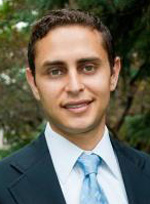Campus News
Finding peace in the ‘world’s most displaced’ country
The signing of a cease-fire in South Sudan last week is a positive step forward but bringing about lasting peace and alleviating poverty will involve substantial grassroots efforts, according to UC Santa Cruz professor Mark Fathi Massoud who has written widely about the world’s youngest nation.

The signing of a cease-fire in South Sudan last week is a positive step forward but bringing about lasting peace and alleviating poverty will involve substantial grassroots efforts, according to UC Santa Cruz professor Mark Fathi Massoud who has written widely about the world’s youngest nation.
“It’s a tremendous change in what’s been a worsening conflict,” said Massoud, assistant professor of politics and legal studies. Writing in the February 3 issue of Christian Science Monitor, Massoud says, “A radical middle ground in South Sudan is possible. And it will emerge from a shared appreciation of the country’s political history and will involve building peace from the grassroots.”
Massoud is author of Law’s Fragile State: Colonial, Authoritarian and Humanitarian Legacies in Sudan (Cambridge University Press, 2013) scheduled to be published in paperback in April. He spent 15 months in Sudan between 2005 and 2010 investigating the country’s legal and political history.
Decades of war in Sudan produced the world’s largest number of internally displaced persons and led to South Sudan’s July 2011 secession from Sudan, making South Sudan the world’s newest country – and one of the poorest.
Aid groups lauded the secession as a positive step for the war-torn region. But conflict along the oil-rich border with Sudan and within South Sudan has led to the deaths of thousands and displaced more than half a million South Sudanese. The most intense period of fighting began last month when rebels backing the ousted vice president started battling government troops.
Massoud’s analysis focuses on how grassroots expertise, particularly from community leaders including women activists and local clergy, can help construct lasting peace. Rather than concentrating on foreign involvement or investment, look to South Sudanese activists who are promoting social change, Massoud says. “Local elders, religious figures, and civic activists can share a message of mercy and forgiveness that transcends ethnic, national, political, and religious divisions that have too often catalyzed youth into battle.”
In addition to writing for Christian Science Monitor, Massoud has written about the struggle for peace in Sudan and South Sudan for The New York Times and Foreign Policy magazine.
Earlier this month, he participated in Harvard Law School’s Institute for Global Law and Policy Workshop in Doha, Qatar. The objective was to bring together 100 rising scholars and policy professionals from more than 50 countries to discuss pressing global legal and policy issues, particularly those affecting the region.
At UCSC this quarter, Massoud is teaching a course in Human Rights and a senior seminar called Comparative Law and Society.